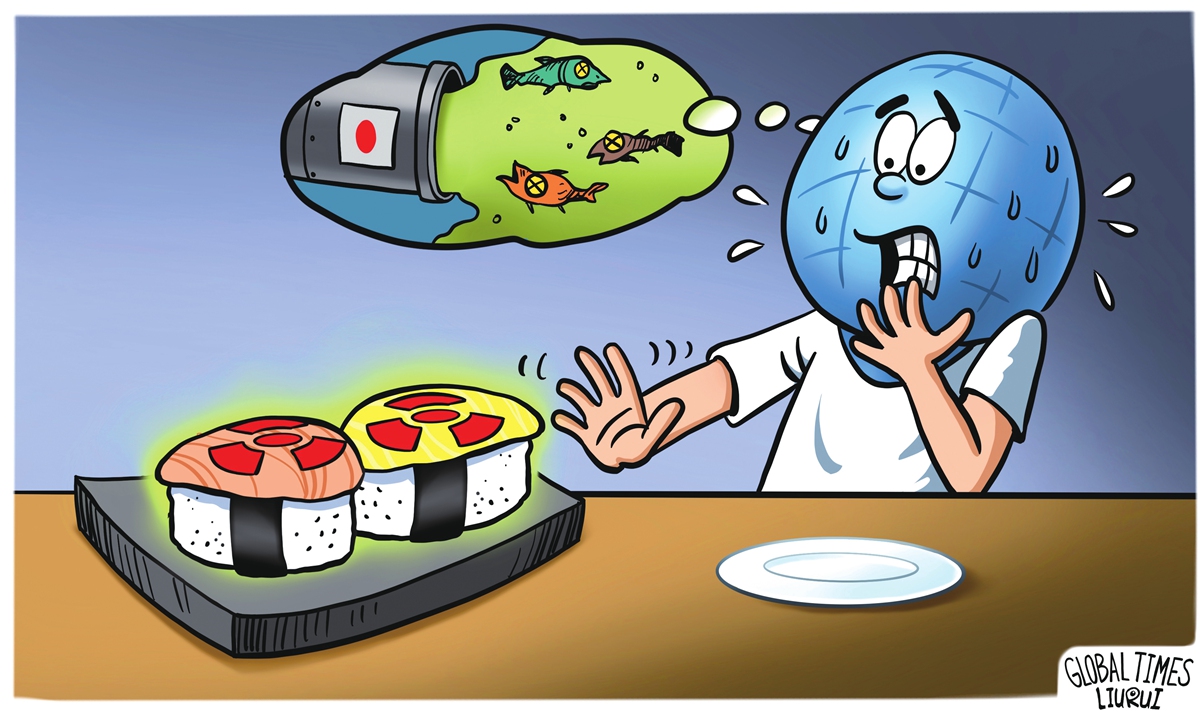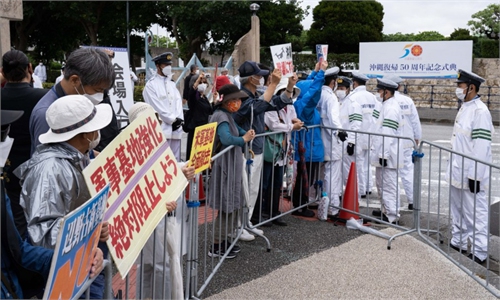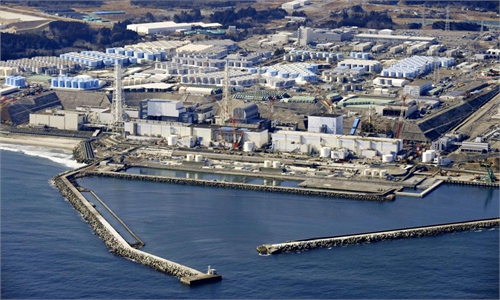Chinese FM slams Japan's second round of nuclear-contaminated wastewater dumping; experts warn of further damage to Japan's exports and tourism sectors

Contaminated. Illustration:Liu Rui/GT
In spite of international outrage, Japan on Thursday began releasing a second round of nuclear-contaminated wastewater from Fukushima. Chinese experts warned that this latest irresponsible move will not only further damage Japan’s international reputation, but also continue to eat away at Japan’s exports to China and discourage travel to Japan.
Plant operator Tokyo Electric Power Company Holdings (TEPCO) said it finished inspections following the initial release, which concluded on September 11, and found no reason to alter procedures. During the first round, the company said a total of 7,788 tons of treated water, stored in 10 tanks within the plant's premises, were released, according to the Japan Times.
In the second round, roughly the same amount of water is set to be released over 17 days, the utility operator confirmed. TEPCO added that the treated water is stored in over 1,000 tanks.
Overall, the dumping of the water into the Pacific Ocean is expected to take three decades to complete.
After Japan's move, a spokesperson from the Chinese Ministry of Foreign Affairs stated on Thursday that China's stance on Japan's dumping of nuclear-contaminated wastewater from Fukushima has always been consistent and clear. The spokesperson emphasized, "We firmly oppose Japan's unilateral action of discharging the water into the sea."
The spokesperson also urged the Japanese government to comprehensively respond to the concerns of the international community and engage in full consultations with neighboring countries in a sincere manner, and responsibly handle the disposal of nuclear-contaminated water. The international community should promote the establishment of a long-term and effective international monitoring arrangement and ensure the active participation of relevant parties, including neighboring countries of Japan, said the spokesperson.
Hong Kong’s Secretary for Environment and Ecology Tse Chin-wan said on Wednesday that Hong Kong has no plans to ease restrictions on Japanese seafood imports, reiterating the government’s opposition to Japan’s “unilateral” decision to dump wastewater from the crippled nuclear plant.
“The ball is in Japan’s court. If Japan does not change its ways, I don’t see that we are under any condition to [relax the bans],” Tse said.
China’s customs authority banned imports of all seafood from Japan starting from August 24, in response to Japan’s dumping nuclear-contaminated wastewater from the plant.
China's seafood imports from Japan in August dived 67.6 percent from a year earlier to 149.02 million yuan ($20.44 million), after a fall of 28.5 percent in July, Kyodo News reported, citing data from Chinese customs released last month.
Japan’s seafood exports to South Korea also plunged in August, according to reports.
Japan's nuclear-contaminated wastewater dumping opened a Pandora's Box and the damage to Japan's fishery industry will worsen, Lü Xiang, a research fellow at the Chinese Academy of Social Sciences, told the Global Times. The expert also said that if Japan continues to dump nuclear-contaminated wastewater, it will face more international condemnation potentially devastating Japan's seafood export market.
During China’s eight-day Mid-Autumn Festival and National Day holidays, which last from September 29 to October 6, long lines can be seen at most restaurants in the Chinese capital of Beijing, however, some Japanese restaurants remained empty. When a Global Times reporter visited the popular Solana shopping mall in Beijing on Wednesday, no one was dining at the two Japanese restaurants in the complex.
A waitress from one of the Japanese restaurants told the Global Times that she only received a few customers during the holidays, because “people are concerned about the nuclear-contaminated wastewater [from Japan].”
The wastewater issue is not only hitting seafood exports, Chinese tourists’ enthusiasm for traveling to the country has also taken a hit following Tokyo’s irresponsible move. Ahead of the holidays, cancellations of Chinese tours to the country had already begun, media reported last month, ahead of the holidays.
However, many Japanese media outlets began to claim that despite concerns about the dumping of nuclear-contaminated wastewater, Japan remained a hotspot for Chinese tourists during the holidays.
The Japan Times reported on September 29 that “Japanese airlines' flights from China to Japan are almost fully booked during an eight-day holiday that began Friday, the airlines said, despite Chinese media reports last month that Japan-bound trips had been canceled following the release of treated radioactive water from the crippled Fukushima nuclear power plant into the sea.”
Da Zhigang, director of the Institute of Northeast Asian Studies at the Heilongjiang Provincial Academy of Social Sciences refuted the report.
He said that the Japanese media linked various reasons behind the surge of Chinese visitors in Japan, including the fact that China resumed Japan-bound group tours, the demands for business trips and visiting family members are growing, adding that October is also when foreign students enroll in Japanese colleges.
They generalized "Chinese people traveling to Japan" as "Chinese tourists," ignoring the fact that the passengers include a large number of business people and students, and even some Japanese citizens are on these so-called "packed" flights to Japan.
Da also said these Japanese media outlets are using "tourism public opinion warfare" to muddle through and downplay their country's responsibility in wastewater dumping, as they link the "Chinese visitors to Japan" with the issue of Japan's dumping of nuclear-contaminated wastewater into the sea.


